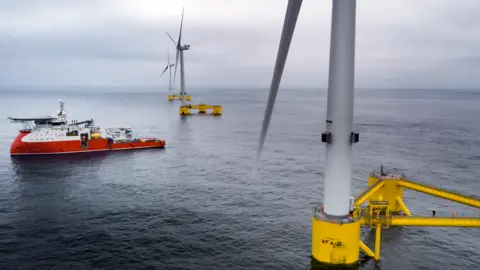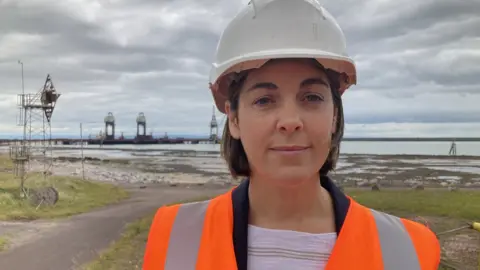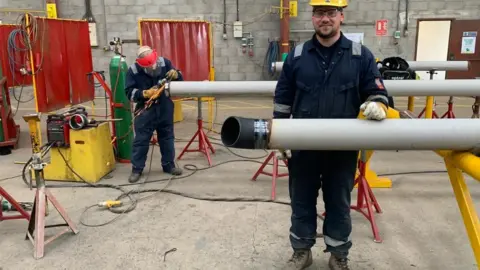Floating wind farms at sea to create 29,000 jobs - Crown Estate
 Principle Power | Artist DOCK90
Principle Power | Artist DOCK90Plans to generate electricity through floating wind farms off the south Wales coast could create thousands of new jobs, according to the Crown Estate.
The property business owned by the monarch but run independently said the new industry could create about 29,000 jobs, including 10,000 in Wales.
It is leasing the space to generate enough power for four million homes.
But firms looking to win contracts from the plans have urged licensing authorities against delays.
"It's a big opportunity to create a new sector in Wales and the UK," said the Crown Estate's Nicola Clay.
"This is absolutely going to happen, interest is growing."

Until now most offshore wind farms in the UK have been built into the seabed on fixed foundations.
Floating wind farms can be deployed in deeper water than conventional offshore wind farms, where there is often higher wind, such as off the coast of Pembrokeshire.
The wind turbines are floated on massive steel structures and tethered or anchored to the seabed.
The Crown Estate tenders will be issued in summer 2023 and could potentially inject £43.6bn into the UK economy by 2050, according to industry body the Offshore Renewable Energy Catapult.

It could bring new opportunities for Wales as the area of the seabed that the Crown Estate is licensing is 40 miles off south Wales.
Of the estimated 29,00 jobs created, some 10,000 would be in Wales, building and running the sites.
Areas like Port Talbot and parts of Pembrokeshire have the deep ports, empty sites and skills that the floating wind industry would need.
Large open areas of land, a deep port, good connections with the electricity grid, vast amounts of steel as well as manufacturing and metal construction skills are all necessary.
The floating wind turbines will be mounted onto huge steel structures that could be assembled on the side of the port at Pembroke Dock and towed out to sea.
Ledwood Engineering, based in Pembroke Dock, is one of the local firms that has worked for the oil industry for many years and hopes to win some of that work.
As refineries closed locally, the company and employees had to find new work. The firm recently won a large contract to work on the construction of the new nuclear power station at Hinkley Point.

For welders like Ryan Gwyther, that meant jobs in Newcastle, Belfast and beyond. He hopes he will now get work building the structures needed for building floating wind farms.
"It's my career, welding and pipework. If there was no work here I'd have to move elsewhere," he said.
George James, also a welder, said there were few other options in Pembrokeshire. "It is mainly these trades, unless you are going into domestic plumbing," he said.
Nick Revell, managing director of Ledwood Engineering, has warned potential jobs could be lost if the public bodies involved in licensing the new industry were too slow.
"We have the Crown Estate that have got to do work on this and provide good solutions in a timely manner," he said.
"Similarly [Natural Resources Wales] NRW, they also have to come to the table and make it work."
The Crown Estate said is was working as quickly as possible.
Andrea Winterton, marine services manager at Natural Resources Wales, which is responsible for looking after the environment and landscape of Wales' coastal areas, said: "We are working with a number of offshore floating wind and other marine renewable developers with respect to their proposals, as well as with industry representatives, the Crown Estate and Welsh Government at a strategic level.
"We offer potential developers pre-application advice and guidance, and work with them throughout their application progress to achieve the sustainable management of our natural resources."
She added that this could be seen in the recent marine licensing decision reached for another marine renewables project, Morlais, off the west coast of Anglesey,.
"We will continue to advise the Crown Estate on their seabed leasing plans for floating offshore wind and continue to work with all our stakeholders to drive forward the crucial work of marine renewable energy in Wales".

- BORN DEAF, RAISED HEARING: Jonny Cotsen explores what it means to live in two different worlds
- CAREER CHANGE WITH A DIFFERENCE: Police new recruits adapt to life on the beat

